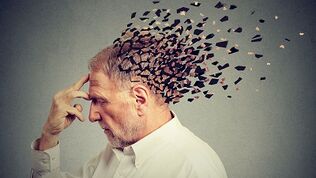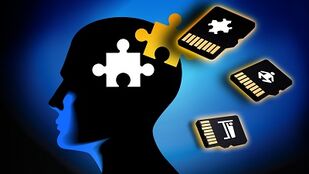
There are conflicting viewpoints about memory enhancing drugs. Some say that it is useful and helps to deal with increased intellectual stress, which is very helpful and effective.
Others say that this is a myth, that there is no point in using these drugs, it can even be dangerous and addictive to them. Let's try to consider both points of view in more detail and find out who is right.
A little bit about memory
Memory is a mental function of higher neural activity, with the help of which occurs the accumulation, preservation and reproduction of previously received information. Memory allows you to store information for a long time about the outside world or the body's reaction to any impact, and it also allows you to use this information for the correct arrangement of future activities.
Memory includes several different but related processes.
- Memorization- new data entry, sensation.
- Storage- accumulation of data, sensation, including processing and assimilation. This process allows a person to learn, develop his thoughts and speech.
- Reproduction and introduction- actualization of elements, actions, sensations from the past. Reproduction is involuntary (elements "drift" in a person's mind without his will and effort) and arbitrary.
- Forgotten- loss of the ability to reproduce and recognize previously remembered elements. It can be temporary or permanent. There is incomplete forgetting, when the information is reproduced or identified by mistake or part.
Base memory type
There are many types and subtypes in memory classification. Let's talk about the main types.
- Sensory memory- preservation of information from the senses after stimulating it.
- Tactile memory- preservation of information from receptors as a result of touch.
- Motor memory- stores information about movements, many may remember that there are movements they perform automatically.
- Semantic memory- stores information about facts, for example, stories learned, dates, times tables.
- Short-term memory- stores information for a short time. Has a small volume.
- Long-term memory- storage of information for an unlimited time, including its lifetime.
Memory Law

Few people know that there are a number of laws of memory. It is not the author's creation, but a scientifically established and proven pattern of real life.
- Law of repetition- information is remembered much better when it is repeated several times.
- The Law of Interest- if someone is interested in information, then he will remember it faster and better.
- Law of the Edge- information given at the beginning and at the end is best remembered.
- The Law of Understanding- when the information is deeply understood, it is better remembered.
- Optimal line length law- the amount of memorized information should not exceed the amount of short-term memory.
- Installation Laws- a person who has done an installation so he needs to remember this or that information, will remember it faster and better.
- Law of resistance- when memorizing similar concepts, old information "overlaps" with new ones.
- Law of Context- when memorizing things that can be related to a familiar concept, it goes much faster.
- The Law of Action- if what is memorized is used in practice, memorization occurs more efficiently and quickly.
This law can be used if you want to remember things faster and better, as well as to train your memory.
Reasons for memory loss
- Organic brain damage- acute disorders of brain circulation, traumatic brain injury, brain tumors.
- Diseases of other organs and systems- diseases of the liver, cardiovascular system.
- External factors- poor ecology, sharp changes in environmental conditions, stress, sleep disturbances.
- Age-related changes in brain structure- decreased number of interneuronal connections.
- Chronic poisoning- smoking, taking drugs, substance abuse, alcoholism, drug abuse (sedatives, tranquilizers).
Treatment of memory disorders
Medication is not prescribed immediately if memory enhancement is required. First, they tried to apply non-drug methods. This includes:
- A brisk walk in the fresh air. This improves oxygen access to the brain. This increases its work efficiency.
- Normalize sleepand wake up.
- Evening training- the habit of remembering all the events of the day in reverse order, that is, first of all, remembering what happened in the evening, and at the end - the morning program, can be training that is notthe usual. It is better to do this before going to sleep, lying in bed.
- Positive attitude, don't think about this- don't think that you have a bad memory, nothing can undo the effects of self-hypnosis. If at some point you can't remember something, then don't worry, don't be angry, but distract yourself, do something else, and then try again to remember what you forgot.
- Daily training- solve crosswords, riddles, scanwords.
- Education- learn poetry, foreign languages, do it regularly, gradually increase the amount of material you learn.
Remedy for memory loss

It is clear that learning poetry, foreign languages, solving puzzles is not easy, you need to "bother", extra time should be allocated for walking and solving puzzles, which practically do not have a working person.
It's much easier to take a pill, calm down and hope for the miraculous power of the drug - your memory will soon improve and you won't have to do anything! A modern city dweller is so lazy and spoiled by the results of civilization that now few people have a goal and want to spend their time and energy on memory training. So someone is looking for the answer to his question - what pills are there for memory enhancement?
So, consider two opposing opinions about this score:
Positive opinion
Proponents of using these funds say that a number of drugs help increase blood supply to brain cells, thereby increasing their nutrition and supplying more oxygen, which increases metabolic processes in neurons.
Nootropics and drugs which improve the rheological properties of the blood help in this.
Herbal preparations have become widespread, which not only increases metabolic processes in neurons by themselves, but also enhances the effect of nootropic drugs.
But it must be remembered that each drug (really exists) has its own contraindications and side effects, therefore it should only be prescribed by a doctor for each specific clinical case.
Negative opinions
According to some experts, there is also a downside. Several years ago, experts were puzzled by the question - is this drug effective or is it just a placebo effect?
As a result of many studies, the effectiveness of the nootropic has not been proven. There is no evidence that they have a beneficial effect on memory. One small study on the effectiveness of the drug has shown that the effect is small, but not in severe cases.
Traditional methods and herbal preparations such as ginseng and vitamin E have practically no research. The evidence base is only for the use of herbal remedies in patients with dementia. But there are no data on the effectiveness of use in relatively healthy people.
In conclusion, I would like to say that when thinking about which drug for improving memory is best, do not forget that it must be prescribed by a doctor. And doctors also have to evaluate the effectiveness in each case. Don't rely on advice from friends, neighbors, or relatives.
If you think your memory is deteriorating, see a neurologist. Maybe this is not a problem at all, the attention may be distracted, there could be some other problem. It is also necessary to know the cause of this condition. And this can only be done by a qualified doctor.







































































